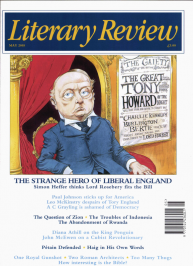Peter McDonald
Poet on Holiday
The Prodigal
By Derek Walcott
Faber & Faber 106pp £12.99
Most writers will know the feeling, though for poets it’s perhaps especially strong: at first, the problem is that there’s almost too much to write about, and too little time in which to get it all written; then after a while the supply of subject matter seems to dry up, and there is no end of time in which to carry on with the writing. Successful authors often solve this one by discovering that their own success (sorry, life) is a fascinating subject in itself; and very successful writers (we’re talking Nobel Prize level here) have a particular burden of significance to bear, as stoically as they can, in their continuing lives and letters.
Derek Walcott, of course, is one of those Nobel laureates in poetry whose work has a large, admiring following, and it is possible to see what many of his readers enjoy. Unaffectedly, he has always steered an independent course through literary fashions, writing in the mainstream of twentieth-century metrical verse,

Sign Up to our newsletter
Receive free articles, highlights from the archive, news, details of prizes, and much more.@Lit_Review
Follow Literary Review on Twitter
Twitter Feed
It wasn’t until 1825 that Pepys’s diary became available for the first time. How it was eventually decrypted and published is a story of subterfuge and duplicity.
Kate Loveman tells the tale.
Kate Loveman - Publishing Pepys
Kate Loveman: Publishing Pepys
literaryreview.co.uk
Arthur Christopher Benson was a pillar of the Edwardian establishment. He was supremely well connected. As his newly published diaries reveal, he was also riotously indiscreet.
Piers Brendon compares Benson’s journals to others from the 20th century.
Piers Brendon - Land of Dopes & Tories
Piers Brendon: Land of Dopes & Tories - The Benson Diaries: Selections from the Diary of Arthur Christopher Benson by Eamon Duffy & Ronald Hyam (edd)
literaryreview.co.uk
Of the siblings Gwen and Augustus John, it is Augustus who has commanded most attention from collectors and connoisseurs.
Was he really the finer artist, asks Tanya Harrod, or is it time Gwen emerged from her brother’s shadow?
Tanya Harrod - Cut from the Same Canvas
Tanya Harrod: Cut from the Same Canvas - Artists, Siblings, Visionaries: The Lives and Loves of Gwen and Augustus John by Judith Mackrell
literaryreview.co.uk